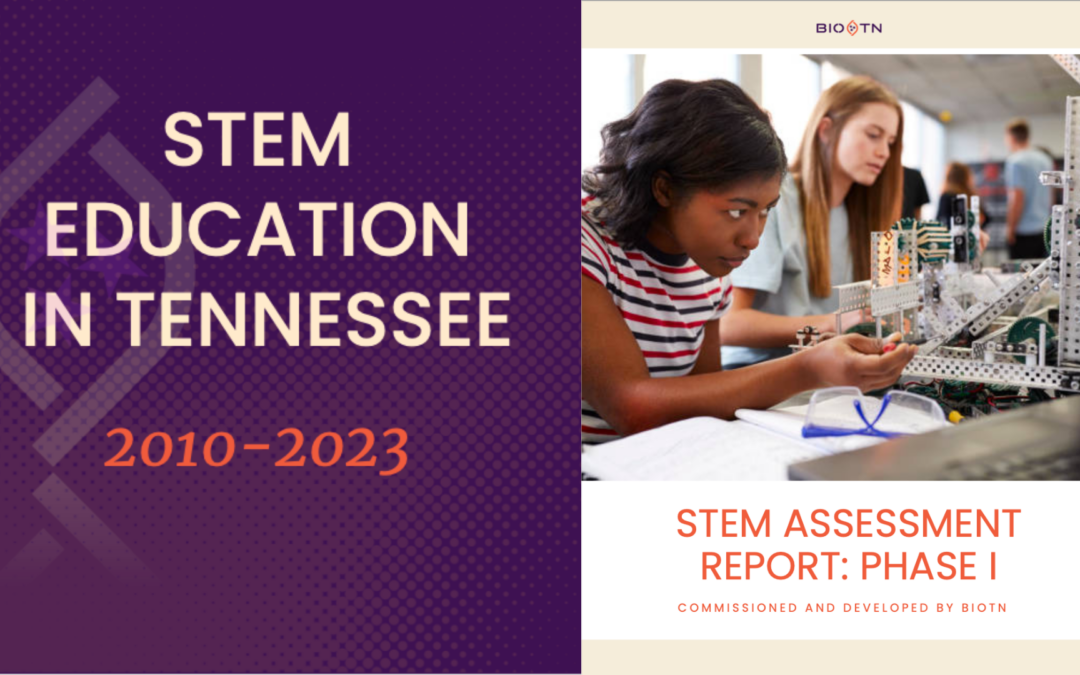BioTN Releases Phase 1 of Comprehensive STEM Assessment
Report underscores student achievements when programs are appropriately resourced, emphasizes need for robust investment in STEM-related education throughout Tennessee
BioTN Releases Phase 1 of Comprehensive STEM Assessment
November 30, 2023 — STEM-related work is the fastest-growing economic sector in the United States. And when Tennessee’s STEM students are provided with opportunity and investment, they outperform their peers. It is, therefore, time to redouble our efforts as a state to prioritize STEM education. This is one of the core findings of BioTN’s new and comprehensive STEM Assessment Report.
Phase 1 of that report, released today, analyzes the state of science-, technology-, engineering- and math-based professions in Tennessee, and our education system’s preparedness to meet the increase in demand for STEM-focused workers to fill these high-wage positions.
STEM-related jobs currently account for about 70 percent of the U.S. workforce. Careers in STEM are the primary driver of economic advancement in the U.S. and key to building a better economy for Tennesseans.
“Ensuring there are enough qualified STEM workers, as well as better participation from under-represented groups, will take a strategic focus on K-12 STEM education and increased access to college preparatory programs that promote STEM careers,” said Dr. Samuel Lynch, chairman and founder of BioTN, the non-profit organization releasing the report.
There is good news to report here, but also a cautionary note: When Tennessee invests in STEM programs, such as the $500 million Race to the Top initiative, our students outperform their peers from other states. But maintaining those advances requires purposeful and continued focus and investment. Furthermore, while Tennessee students’ rank in math and science has improved over the last decade as compared to other students across the country, it is largely a function of the performance of Tennessee students maintaining flat, but steady achievement scores, while the average scores of students in other states have declined.
High achievement in K-12 math and science courses is one of the strongest indicators that an individual will pursue STEM studies after high school, leading to future well-paying jobs and economic advancement.
Tennessee students’ math and science performance has improved overall since 2010, fueled by intentional statewide focus in the early 2010s. However, many of those overall gains are offset by a noticeable dropoff that began in 2015, in conjunction with the adoption of Common Core State Standards and new testing rubrics, and accelerated during the COVID-19 pandemic.
Our assessment shows that the demand for STEM-proficient workers in Tennessee is already strong and will only continue to grow. As of 2019, according to the National Science Foundation, STEM jobs already represented 23.3 percent of Tennessee’s total workforce, more than a full percentage point higher than the national average (22.1 percent).
Average wages in STEM-related positions are $95,000 a year – more than double the average for non-STEM jobs. Investing in Tennessee students’ preparedness to enter these fields is a direct investment in their futures and in the state’s future economic prosperity.
Additionally, our report demonstrates the efficacy of STEM-centric education initiatives such as the $500 million Race to the Top initiative, underscoring the need for continued investment in STEM education to reverse the downturn in student proficiency and prepare Tennessee’s young people to enter an increasingly tech- and science-centric job market that is ripe with economic potential.
In Phase 2 of our assessment, targeted for release in 2024, we will explore the lasting impacts of some of the programs and initiatives spotlighted in Phase 1, highlight successful national efforts to improve STEM education, and offer recommendations for how Tennessee can continue to promote STEM education and increase student success.
About BioTN
BioTN’s is a non-profit with a mission to promote, within the state of Tennessee and beyond: 1) knowledge of, and education in, STEM and the biosciences 2) innovation and entrepreneurship in STEM and the biosciences, and 3) the positive impact of STEM and the biosciences on human health.

Recent Comments